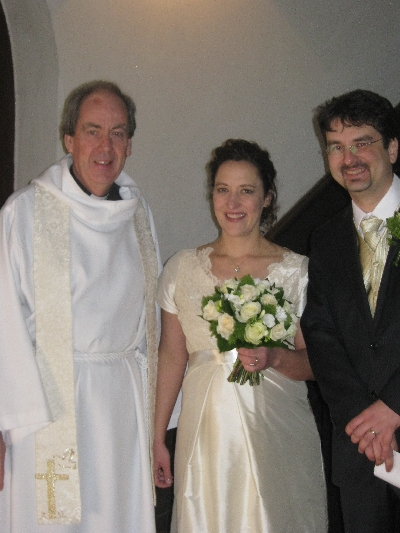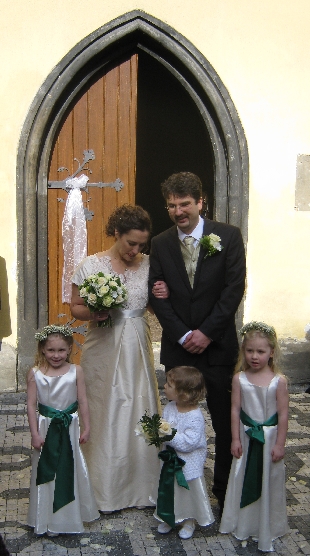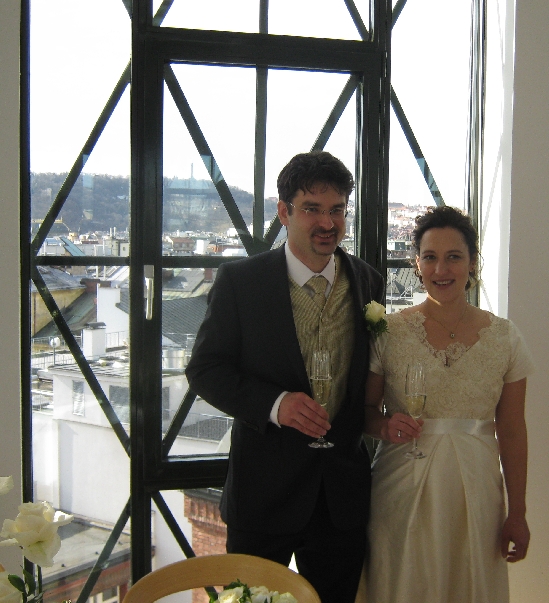
I am the youngest of three children. My eldest sister June, is nearly nine years my senior. On Saturday 31st March 1962, at the tender age of eighteen, June married my brother-in-law Garry, the wedding taking place at Warwick Road Congregational (now United Reformed) Church in Coventry. The picture on the left is of the happy couple outside the Church following their marriage and the boyish face behind Garry’s shoulder is none other than Yours Truly, aged ten!
Exactly fifty years later, on Saturday 31st March 2012, June and Garry celebrated their Golden Wedding anniversary. They marked the occasion by holding a most enjoyable buffet lunch in the Branksome Dene Community Rooms, Poole which overlook the beach near their home for the past twenty years in Westbourne, Bournemouth. The Prague Church Council kindly agreed to me having a pre-Easter rather than my normal post-Easter break, which allowed Sybille and I to be present and join the celebrations.

Our trip to the UK was only my second since moving to Prague just over three and a half years ago and was Sybille’s first during this same period of time. We flew from Prague to London Gatwick late in the evening of Thursday 29th March and stayed that night and the following one, in a little cottage in the grounds of Bishop’s Lodge, Worth, on the outskirts of Crawley. The Bishop’s Lodge of Rt Rev’d Dr Geoffrey Rowell, Anglican Diocesan Bishop in Europe, is deliberately located only ten minutes drive from Gatwick making it very convenient both for him and us!
In order to make the most of our four days in the UK, I had arranged online in advance, to hire a car at the airport. In order save money on both hire charges and fuel, I chose to hire a vehicle from the ‘small car’ category. You can probably imagine my amusement when I discovered that the car allocated to me was a brand-new Skoda Fabia – made in the Czech Republic!
Whilst I am well used to driving my own right-hand drive (RHD) car on the right (as opposed to left) side of the road here in the Czech Republic, what did seem strange was driving a RHD car on the left side of the road, something I hadn’t done for over three and a half years. Several times I came very close to driving on the right with Sybille regularly telling me ‘links fahren’, in order to remind me not to cause an accident!
Just before 9am on Saturday 31st March, we set out from the cottage, to drive to Bournemouth/Poole. The journey took us diagonally across West Sussex, a part of England that was new to me having only previously visited the very north-eastern corner of the county to get to Gatwick Airport on several previous occasions and having once driven further south to Brighton. However, once we reached Hampshire and the M27 around Portsmouth, we were back on more familiar territory. We arrived at the Premier Inn in Bournemouth, where we were booked to stay the night, with plenty of time to park the car, get appropriately dressed and then walk down to the sea front to the celebratory lunch venue.
|
|
|
It was interesting to realise that I was one of a handful of people present at the Buffet Lunch, who had also been present fifty years previously at June and Garry’s wedding. Most of the guests last Saturday, were friends that June and Garry have made locally since they moved to Bournemouth from just outside Leamington Spa in the Midlands, more that twenty years ago. Sybille and I also had the distinction of being the two who had travelled the furthest in order to join the celebrations.
June and Garry have two children, Tim and Tom – the arrival of Tim into this world making me an uncle at the age of twelve. Tim and his partner Deborah have since made June and Garry grandparents and in turn, have made me a great uncle! It was lovely to see my great niece Lilith and my great nephew Silas, for only the second time in theirs and my lifetime.
Below is the, probably never to be repeated family photo, unless that is, we all come together again to mark June and Garry’s Diamond Wedding Anniversary, now due in less than ten years time!











